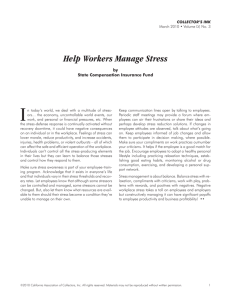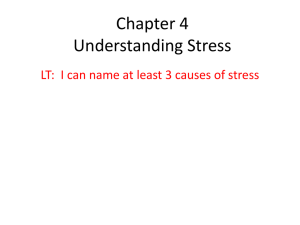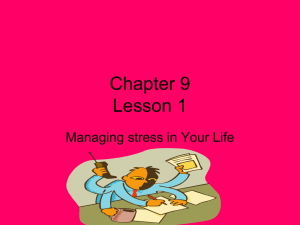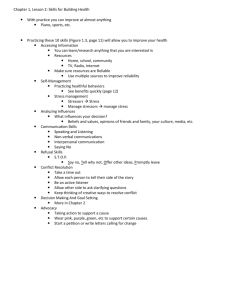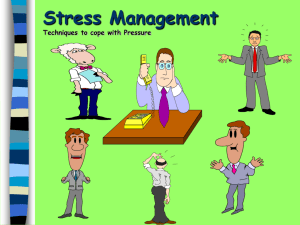Stress and How to Handle It
advertisement
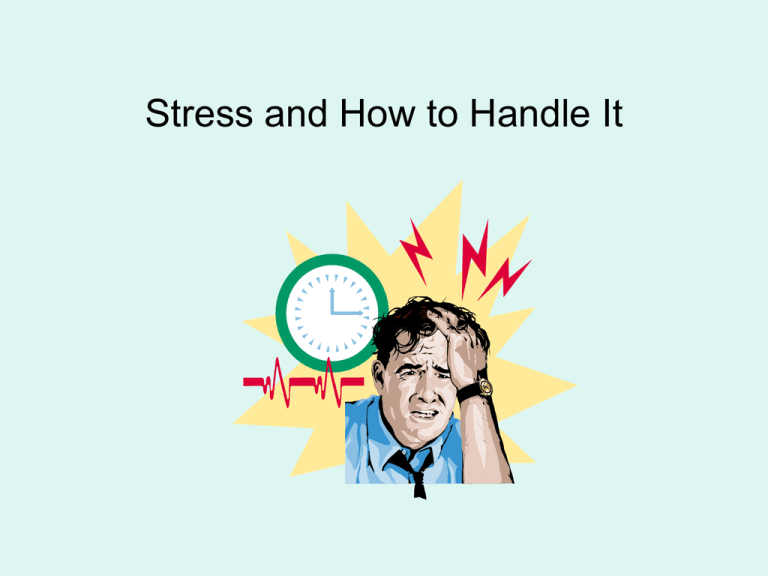
Stress and How to Handle It Stress and Fatigue The Health and Safety in Employment Act 1992( amended in 2003) now covers stress and fatigue as potential work hazards and sources of harm and that certain behaviours may create a hazard. So stress or fatigue can be the result of a hazard in the workplace or Stress may cause hazards in the workplace Why do we get stressed? Let me tell you a little story, picture this scene. • A caveman is sitting in his cave minding his own business when he hears a loud roar. His brain reads this as a sabre-toothed tiger and puts out a red alert to all parts of his body to prepare for fight or flight. He’ll have to take on the sabre-toothed tiger or run for his life. He looks around, sees a club grabs it and belts the tiger on the head. He feels much much better. • You would too if you could belt the people in your life who are causing you stress! but unfortunately you would face jail, so this is not an option. What is stress • • • When your brain perceives that your life is under threat it sends messages to all parts of the body to prepare for action. It is an automatic reaction to challenge that helps to save your life by giving a powerful boost to your breathing , blood pressure and heart rate to pump three or four times more blood to the muscles than normal. Your liver releases sugar into your bloodstream and the blood vessels in your larger muscles expand to get energy and oxygen to where they are needed. Your muscles tense, digestion stops and all your senses are heightened. The main reason your body makes this transformation is due to the release of the hormones of stress namely Cortisone and Adrenaline. Nowadays we may not encounter many sabre-toothed tigers, but our bodies have been programmed to react to circumstances such as running late for work, family or work problems in the same way as they would respond to a life–threatening event. You may not think you are getting worked up, but your brain may be treating it as though your life were on the line. Instead of working it off by belting the tiger, we allow it to eat away at our insides – and that is what causes the problem. Stressors - what are they? Basically there are two types of stressors: External and Internal External stressors can be: • To much noise • Too much mess • Too much work • Too much responsibilities • Unhappy relationships • Changes • A disorganised workplace • Too much stimulation • Not enough stimulation Internal Stressors can be: • Our physical health • Our mental state • Our Self-talk Self - talk Lets take a moment to think about self-talk. Its something we all do most of the time and is a big factor in the world of Stress. We spend much of our day talking to ourselves. We are in constant dialogue with our brains, commenting on how we feel about things, perhaps even the odd rude remark that, fortunately no-one hears. Self-talk helps us make sense of our world and helps to get our thinking straight. Sadly we often give ourselves the wrong messages, like “I should have…” or “I ought to have….” and “I have to…” or “I must…” We tend to set unrealistic standards of perfection for ourselves – how many of us are perfect? More on this later……. So is stress bad for us? Do You Recognise Any of These Symptoms in yourself? In others? • • • • • • • • • • • • • Headaches Insomnia Tiredness Palpitations Heavy Sweating Tight or painful muscles and or joints Constipation (hard to notice in others!) Indigestion and or stomach upsets Skin rashes and or itches High blood pressure Frequent nervous tics, muscle spasm or twitching eyelids Tearfulness for no apparent reason Frequent colds or flu What can we do about Stress ? Now we know what it is and what causes it, What can we do about it? • It is important to understand that as human animals we cannot, indeed should not, eradicate stress from our lives completely. It is one of the primal driving forces in our lives. However, as with all things too much stress or an uncontrolled stress level can be a negative and even dangerous thing for us. So what can you do? • Well firstly the operative word here is you. I will offer you stress management techniques some of which will help you, but only if you experiment, find out what works for you, and apply the chosen technique in the future Stress Management Techniques Different techniques work for different people depending on their personalities and their circumstances. Indeed different techniques will work for the same person at different times depending on their need at the time. So be open minded, and remember what may not work for you now may do in the future. “Don’t sweat the small stuff” Worries (or stressors) have a way of building up, leaving you with a general sense of anxiety and discomfort. Here are some simple ways to tackle worries on a day-to-day basis to help lessen the tension and allow you to get on with your life. • Question it! - is it really your problem? • Talk it out! – share your problems with someone you trust. • Write it down! – putting it on paper will help you get things into perspective. • Distance it! – imagine a few days, months, years from now. How much will it matter then? • Exaggerate it! – picture the worst that could really happen. How likely is it? • Attack it! – take the first step to solving the problem. Remember, worrying in itself serves no purpose what so ever. Do something with your worries rather than allowing them to intrude on your day-to-day living Pace Yourself! • Most of us have times during the day when we feel sluggish or have difficulty concentrating. Work out when your low productivity hour is and schedule easier tasks during this time. • When you get to work in the morning set your priorities before any work gets underway. Be sure to systematically draw a line through them as they are achieved, it reminds you of your achievement and provides positive feedback to you. • If you know you are to have a short factual meeting, remain standing. This stops other people getting too comfortable and settling in for a long spell. Remember your time is precious. Exercise and Nutrition Good stress management has often been associated with exercise and eating the correct food. But is there really a link? • Exercise: Exercise can help you feel good and calm you down. It improves your basic fitness and therefore helps you cope with everyday demands as well as the odd crisis. It acts as a distraction and gives you a break from your worries. It is also a healthy outlet when frustrations build. Yes there’s a link! • Nutrition: If stress is a problem for you try to cut down on coffee, caffeine is a stimulant and causes a similar physical response to that produced by the Hormones of Stress. • Some people believe that the feeling of being stressed is caused by a lack of vitamin B in the blood. There is no evidence to support this. Eating regular meals and a balanced diet is the best nutritional advice. Yes there’s a link! Behavioural Stress Relievers • Get into the habit of taking a deep breath each time you look at your watch. • Try to slow down when you eat, talk, drink or drive. • Get up a little earlier to give you more time in the mornings. • Get yourself a pleasant sounding alarm clock. • Self Talk Remember this is what we do to help us make sense of our world, but beware! The “I musts” and the “I should haves” are out. Make such comments kinder and more helpful and realistic for you. Some General Things to Remember • Our reactions to stressors are influenced by many things – our personality, hereditary factors, our finances, previous personal experiences, our health, the state of our personal relationships. • Remember that your capacity to cope with stress varies under differing circumstances and at different stages in your life. • Remember that health professionals are in the business of world peace. If you are not at peace with yourself how can you help the rest of us What Next? Well that’s up to you, you could: • Walk away from here and say what a total waste of time that was! Then nothing would change for you, and if you are deliriously happy all the time then that’s fine. If your not then nothing will change for you. • Adopt one or more of the techniques mentioned today, work at them and improve the quality of your life. • Develop your own stress management plan. • Seek some assistance in developing your own stress management programme. • Take a course in meditation or Yoga • Take on some further reading, I would be happy to recommend some useful books. Acknowledgements • I would like to acknowledge the following: • The Mental Health Foundation of New Zealand • Patricia Cameron-Hill Ba.App.Sc • Shayne Yates MBBS THE END • I hope you have found this presentation enjoyable and informative. • Some of what you have heard is no more than common sense, but sometimes in the rush of life we need someone to remind us of these things. • Be positive be happy. • Thank you for your attention and participation. A teaching tool by T D Projects In a nutshell series
